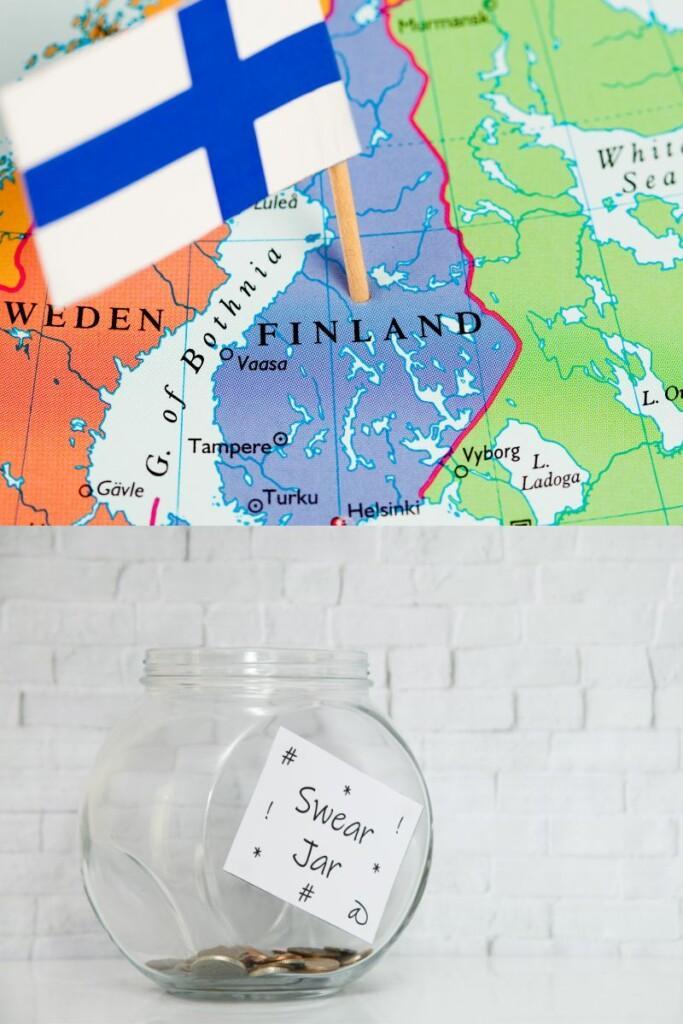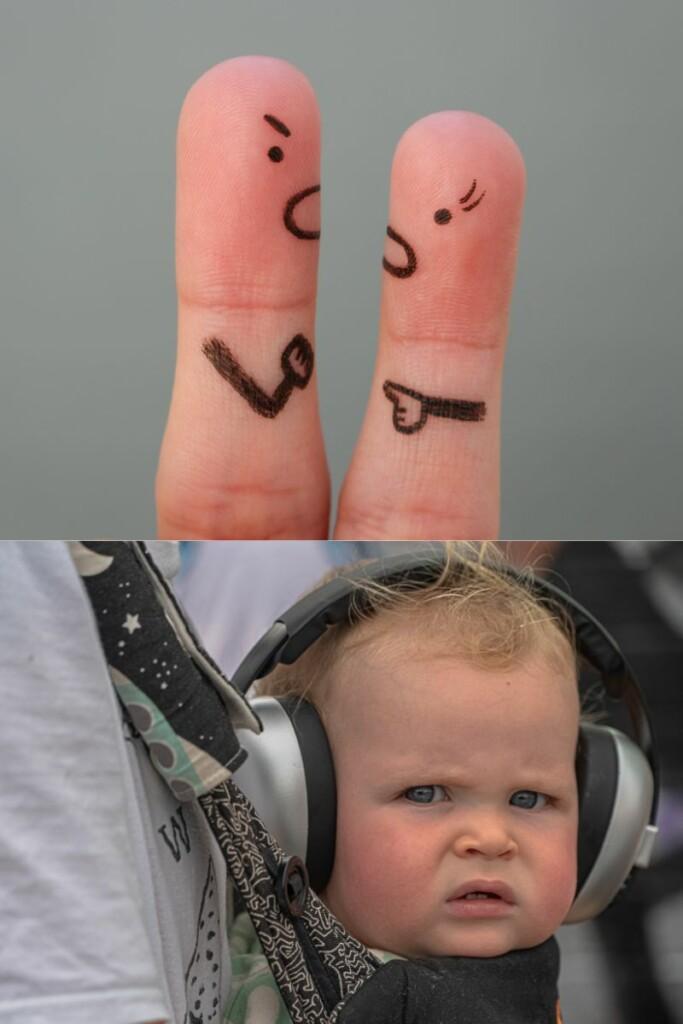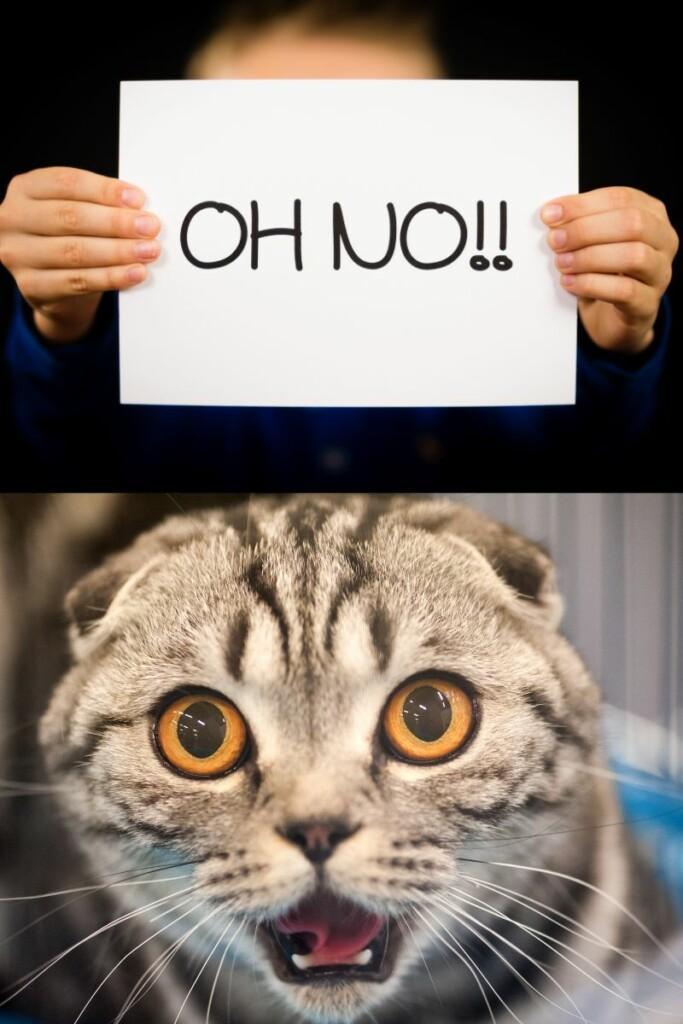Swearing is universal, but like everything in Finland, even cursing has its own unique flavor. Finnish swear words have a deep connection to history, religion, and mythology, making them particularly colorful and expressive.
Whether you’re extremely infuriated with something or need a polite exclamation when you spill your coffee, Finnish offers a wide range of swear words for every occasion.
In this article, I will dive into three categories of Finnish curse words: the truly vulgar, the milder, and some family-friendly (and even cute!) alternatives. You’ll learn about the infamous ones that raise eyebrows, the more casual expressions, and even the ones you can say around your grandmother without feeling guilty.

Table of Contents
Vulgar Finnish Swear Words
Let’s start with the most powerful weapons in the Finnish swear arsenal. These words are considered very vulgar, even in Finnish culture, and are not used lightly. But they certainly capture raw emotions in a way only Finnish can!
- Perkele – Perhaps the most iconic of all Finnish swears, perkele has ancient roots. It refers to an old thunder god, but today, it’s used to express deep frustration or anger. When a Finn mutters “perkele” under their breath, you know they’re seriously annoyed.
- Vittu (and all its variations) – This is one of the harshest Finnish swear words, literally translating to “cunt,” but used in a way similar to the English “fuck.” You’ll hear vittu in countless forms:
- Vitun idiootti – “Fucking idiot.”
- Haista vittu – A strong insult, meaning “smell my cunt,” similar to telling someone to “fuck off.”
- Painu vittuun – Even more intense, meaning “go to the cunt,” or “get the fuck out.”
- Vittuuntunut – Expressing deep frustration or anger, this means you’re “fucking pissed off.”
- Vittupää – Combines vittu with pää (head), creating a particularly nasty insult: “fuckhead.”
- Saatana – Translating to “Satan,” this word carries a similar weight to “damn” or “hell” in English, but it hits much harder. It’s a go-to curse for expressing anger, sometimes even thrown in with perkele for extra impact.
- Helvetti – Meaning “hell,” helvetti is used like “damn” or “hell” when something goes wrong. It’s milder compared to saatana but still not something you’d say in polite company.
- Kusipää – Translating to “piss head,” this is a harsh insult, equivalent to calling someone an “asshole.”
- Paska – Literally “shit,” this is a versatile word that can be used when something’s gone terribly wrong. “Voi paska!” is similar to the English expression “Oh shit!”
- Mulkku – This one is an insult to someone’s character, translating to “dick” or “jerk.”
- Perse – Meaning “ass,” perse is often used to criticize someone or something, and I’ll take a moment to note that this word is definitely not considered a compliment, even if it’s used directly to speak about someone’s behind.
However, Perseestä (meaning “from the ass”) is a very common phrase that you will hear often in spoken Finnish. It is used to express that something is terrible or really bad. Think of it as the Finnish version of calling something “shitty.”
These words are considered quite strong, so they’re typically reserved for intense situations or informal settings. If you’re visiting Finland, it’s good to be aware of them but avoid overuse!

Mild Finnish Swear Words
Now that we’ve gotten the intense ones out of the way, let’s look at some milder curses. These are still expressive, but they won’t get you into as much trouble if you slip one out in a casual conversation.
- Hitto – A softer version of helvetti (“hell”), hitto is the equivalent of saying “heck” or “damn.” It’s a good go-to when you’re annoyed but want to keep things civil.
- Hemmetti – Similar to hitto, this is another mild exclamation of frustration, often used like “heck” or “darn.” It’s a softer substitute for helvetti, perfect for when you need to curse in front of the family members.
- Perhana – A toned-down cousin of perkele, this one is slightly stronger than saying “darn.” You’ll hear this one when someone’s upset but still holding it together.
- Samperi – A mild substitute for saatana, this is used like “dang” or “blast it.” It’s strong enough to convey frustration but won’t offend anyone.
- Piru – Meaning “devil,” piru is often used like “darn” in English. It’s not as harsh as the stronger curses, making it quite versatile.
- Pentele – This is another softer variant of perkele or saatana, used like “darn” or “heck.” It’s a bit old-fashioned, so it comes across as less aggressive.
These words are less offensive and more commonly used in everyday language.

Family-Friendly and Cute Swear Words
Finally, for those moments when you need to express yourself but don’t want to offend anyone (or when little ears are nearby), Finnish also has a range of polite swears. These are perfect for those “oh no!” moments, where you need to let out a little frustration without crossing the line.
- Pahus – A mild expression akin to “darn” or “blast.” You can use this when something minor goes wrong, like dropping your keys.
- Voi ei – Translating to “oh no,” this is a gentle way to express disappointment or surprise. It’s something you might say when realizing you’ve forgotten an important meeting.
- Voi vitsit – A fun, family-friendly way of saying “oh jokes” or “oh shoot.
- Voi hitsiläinen – A softened version of hitto, this is the equivalent of “oh shoot” or “dang it.” It’s mild enough for all audiences.
- Voi pöh – A light, almost playful expression like “oh well” or “whatever.” It’s something you might say when something’s slightly annoying but not worth getting upset over.
- Hupsista – This is a cute way to say “whoops” or “oopsie” when something small goes wrong, like spilling water or knocking something over.
- Voi rähmä – A charming, playful exclamation similar to “oh darn” or “oh fiddlesticks.” It’s got a slightly old-fashioned ring to it, making it all the more endearing.
- Pöh – A soft, dismissive expression that’s equivalent to “meh” or “bah.” You might say this when something is unimpressive or unimportant.
- Höpsis – A fun, gentle way to say “nonsense!” or “oh, come on,” when someone’s being a bit dramatic.
- Höh – An adorable expression of mild disappointment or annoyance, like saying “aww” or “darn.”
- Ähäkutti – A playful, almost childlike taunt, similar to saying “gotcha!” in a fun, teasing manner.
- Pöljä – A sweet, affectionate way of calling someone “silly” or “foolish.”
These words are often used for light teasing or playful expressions of mild frustration. They’re safe and fun in everyday, light-hearted conversations!

Conclusion
Finnish swearing is a world of its own. From the thunderous perkele to the gentle hupsista, there’s a swear word for every occasion in Finnish, whether you’re venting serious frustration or just stubbing your toe. Remember, the stronger words are best saved for moments of real emotion, while the milder and family-friendly options will keep you out of trouble.
Next time you hear a Finn curse, don’t be surprised if it sounds like they’re invoking ancient gods — because sometimes, they really are!

Speak Finnish words in 20 minutes. Discover why Finnish can be much easier than you originally thought.

Start conversations comfortably understanding cultural differences. Learn the one question that confuses Finns.


riku dietke
Wednesday 25th of September 2024
Someone told me if you learn the swearwords of any language that is all you need to know. This is the first time that I have had them spelled out for me, Does this get you into the finnish Navy?As it is said here in America -To swear like a sailor- Something else that I heard that there was a study that said people who swear all of the time are likely to be more honest and trustworthy than someone who does not swear, somehow,I think that there is truth to that
Varpu
Thursday 26th of September 2024
I'm not sure that's the way to get to the Navy, but could be a useful knowledge sometimes :)
Kristine Haataja
Tuesday 24th of September 2024
Hi Varpu, Finnish was my first language, though I only spoke it until I was about 2 years old. Nevertheless, my parents spoke Finnish often, so I understood some and picked up phrases. When I was quite young, probably under 5, I got very angry at my mother and said something that resulted in me having my mouth washed out with soap. I knew I was saying something bad but not exactly how bad. As an adult, I had a pretty good understanding of what that phrase meant, but this blog made it perfectly clear. I said "Saatana Perkele"! Oh, no! No wonder my mother punished me! Thanks for all the new phrases...lol! Kristine Haataja
Varpu
Thursday 26th of September 2024
What a story! Thank you for sharing. I'm glad that this post was able to help you put the pieces of the puzzle together!
Loretta Lindell
Tuesday 24th of September 2024
Perfect!! I recall my grandmothers (1950s Michigan) saying "voi nyt" or "herra yeh" (sp?)
Varpu
Thursday 26th of September 2024
Great memories!!
Vikas Atal
Tuesday 24th of September 2024
Namaste Varpu,
How are you? Hope you ou are well and doing great work as always.
Thank you very much for your kind words. I am eagerly waiting to study in Finland. I want to know more about the Master's program in Finland and I hope you will help me.
I want to meet you and recognize your greatness.
You are really doing a great job to preserve and enrich the culture of your country, which is inspiring for all of us and cannot be praised enough.
I come from a culture, civilization and spiritual tradition that has given the world a great path of peace and non-violence like Mahatma Buddha.
We can bring great changes in this world only by understanding the cultural intangible heritage and diversity of each other's nations, respecting them and loving them.
At this time the world needs Buddha (Peace) and not Yuddh(War).
We all pray to God and the Great leaders of our century to establish peace, tranquility and harmony in this world so that we can see all the little children going to school with a loving smile on their faces, carrying their bags and doing mischievous acts.
Thanks a lot,
Yours, Vk